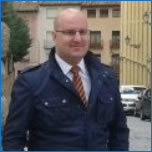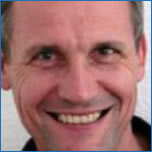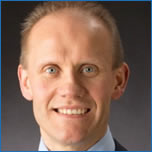Keynote Speakers
 |
Miguel Ángel Higuera, Spain “Pork production in Spain” Miguel Ángel Higuera, SpainVETERINARY MEDICINE degree. University Complutense of Madrid (Spain).
Current Job position: • Director of ANPROGAPOR (Spanish Swine Pro¬ducers Association). Since 2012. Previous job position Co-director of ANPROGAPOR. • Chairman of the Copa-Cogeca Animal Health and Wel¬fare Working Party • Vice-chairman of the Copa-Cogeca Pig Meat Working Party • Member of Copa-Cogeca Working Party on Pig meat • Member of ANAPORC – National Association of scientific swine production. • Member of ANVEPI – Spanish Association of Veteri¬narian of Iberian Pigs. • Member of FESASS – European Federation for Animal Health and Sanitary Security • Expert on pig welfare. Pilot Group on Piglet Castration. DG SANTE. European Commis¬sion (COPA-COGECA) • Expert on pig production. Civil Dialogue on Pig Meat. DG AGRI. European Commission (COPA-COGECA) • European Commission Expert. Advisory Group on Animal Heal¬th and Welfare. DG SANTE (COPA-COGECA) • European Commission Expert. Forecast Pigmeat Group. Expert in market, prices and pig production. • Member of Copa-Cogeca Working Party on Animal Health and Welfare • Member of CEIEA. Spanish Livestock Electronic Identification Bureau |
 |
Josep Font, Spain “What are the costs of pig diseases in the field?” Josep Font, SpainVeterinarian licensed by the Autonomous University of Barcelona (1988), co-founder of SIP in 1999. Of livestock origin, his professional career has always been linked to the world of Swine Production. He began his professional experience in private enterprise as a clinical field veterinarian, and then he was responsible for the R & D Department. Currently, he is part of the management team of the service that SIP offers to the livestock sector.
|
 |
Derald Holtkamp, United States “Economic efficiency on Animal Health intervetions” Derald Holtkamp, United StatesDr. Derald Holtkamp is an Associate Professor in the Department of Veteri¬nary Diagnostics and Production Animal Medicine (VDPAM) in the College of Veterinary Medicine at Iowa State University (Ames, Iowa US). Dr. Hol¬tkamp received his DVM, MS in Agricultural Economics and BS in Agricul¬tural Business with a minor in statistics all from Iowa State University. Prior to joining Iowa State he was a private veterinary consultant. He has also served as a technical services veterinarian for ADViSYS Inc., Vice President of Swine Applications for MetaFarms Inc., Director of Pork Development for E-Markets, Inc. and as a veterinarian and service manager for Smithfield Foods in Warsaw, North Carolina. Dr. Holtkamp’s research focuses on biosecurity as well as the economics and management of swine disease with an emphasis on PRRSV and PEDV.
|
 |
Klaus Depner, Germany “Which is the risk of African Swine Fever expension?” Klaus Depner, GermanyDr. Klaus Depner graduated in Veterinary Science from the School of Ve¬terinary Medicine, Hannover, Germany in 1988. He then worked in Namibia as head of the virology laboratory at the Central Veterinary Laboratory in Windhoek, where he encountered African Swine Fever (ASF) for the first time.
He returned to Germany in 1993 and worked until 1997 as a Senior Scientist at the European Reference Laboratory for Classical Swine Fever (CSF) at the Institute of Virology, School of Veterinary Medicine, Hannover. In 1998, he became head of the German National Refe¬rence Laboratory for CSF and ASF at the Friedrich-Loeffler-Institut (FLI) on the Island of Riems. In 2007, Dr. Klaus Depner went for 1 year to FAO in Rome to be in charge of ‘Transboundary Animal Diseases’ (TAD) in Eastern Europe and Caucasus. During that time ASF entered Georgia and spread over the Caucasus, and he did the first epidemiological investigations for ASF in Georgia, Armenia and Azerbaijan and was involved in the efforts to control and eradication of the disease. From 2008 until 2010, he worked as a legislative officer in the area of animal health and zootech¬nics in Brussels at the European Commission (DG-SANCO) with responsibility for the notifiable pig diseases. In 2010, he returned to the FLI and became first a member and in 2014 head of the International Animal Health Team within the Institute of Epidemiology. He has conducted several epidemiological investigations for ASF in the Baltic States, Poland, Czech Republic, Russia, Belorussia, Moldova, Ro-mania and Ukraine and participated at EU level in the development of ASF control and eradication programs for the affected Member States. Since 2012, Klaus Depner has also been member of the Animal Health and Animal Welfare Panel in EFSA involved in different scientific opinions concerning animal health. |
 |
Fernando Rodríguez, Spain “Where is the vaccine against ASF and what else can we do?” Fernando Rodríguez, SpainPhD in Biology (1994), Dr. Rodriguez has devoted his scientific live to explore new avenues to improve vaccinology. His Thesis work was performed at CISA-INIA (Madrid-Spain) working on African swine fever immunology thanks to a Predoctoral thesis from the Bask Government. In 1995 Dr. Rodriguez moved to The Scripps ins¬titute (La Jolla, CA, USA) to work as an associate professor in the laboratory of Dr. Lind¬say Whitton, first with a postdoctoral fellowship from the Spanish Government and next with another one from the Bask country until the year 2000, when Dr. Rodríguez was promoted to senior associate. During these 5 years at The Scripps Institute, Dr. Rodriguez developed strategies to improve the CD4 and CD8 T-cell responses induced after vacci¬nation, using DNA immunization as a tool. In January 2001 returned to Spain with a FIS contract from the Health Ministry of Spain to work in cancer immunetherapy at the Hos¬pital 12 de Octubre (Madrid). At the end of the year 2003, Dr. Rodríguez moved to CReSA (Barcelona, Spain) with a Ramón y Cajal Contract, later extended with an I3 contract and since then he has been the Principal Investigator of a Research line devoted investigate on African swine fever (ASF). In 2013 Dr. Rodriguez became the coordinator of the exotic diseases Subprogram at CReSA and since September, 2017, he became the Scientific Di¬rector of CReSA; today the Animal health Programa from IRTA (Barcelona, Spain).
Dr. Rodríguez authors 78 per-reviewed articles, 4 Patents and has coordinated 9 Research Projects and 5 private Research contracts with National and International companies. |
 |
Dominiek Maes, Belgium “How to assess biosecurity on-farm?” Dominiek Maes, BelgiumDominiek Maes (DM) is full professor and head of the Unit of Porcine Heal¬th Management at the Faculty of Veterinary Medicine at Ghent University Belgium. He is a specialist of the European College of Porcine Health Ma¬nagement. His main research areas include respiratory disease, sow repro¬duction and production, biosecurity and veterinary public health issues in pig production. DM has published over 260 papers in international peer-re¬viewed journals, and supervised 30 completed PhDs. He is past president of IPVS Belgian branch, the European College of Porcine Health Management, the European Board of Veterinary Speciali¬sation and past-director of the Institute for Continuing Professional Development at the veterinary faculty at Ghent University. He is currently section editor of Livestock Science, and co-editor in chief of the journal Porcine Health Management.
|
 |
Emma Baxter, United Kingdom “Managing large litters” Emma Baxter, United KingdomEmma Baxter is a research scientist at Scotland’s Rural College (SRUC), with expertise in animal welfare and behaviour and interests in integrated pig science. Her PhD work investigated the behavioural and physiological indicators of piglet survival which involved studying survival in a range of farrowing environments, including working on commercial outdoor units. Part of this research included using genetic selection strategies to improve survival. In addition she works with Danish collaborators on the effects of hyper-prolific breeding programmes on sow and piglet welfare and has worked on projects studying the effects of prenatal stress on both short and long-term outcomes for mother and offspring. Currently she works on va¬rious projects involving designing loose-farrowing systems, supporting and monitoring commercial uptake, collating free farrowing information into a web-based platform (www.freefarrowing.org) and gathering on-farm data regarding selecting suitable sows for loose farrowing. She is also invol¬ved in projects looking at automated detection of imminent tail-biting outbreaks, as well as alter¬native humane stunning methods for pigs. She works on commercial farms with all those involved in the supply chain. She was a senior tutor on the EU initiative Better Training for Safer Food which organises and implements training activities on animal welfare mainly for EU member states. She has published over 25 peer reviewed manuscripts and book chapters including reviews on piglet survival, alternative farrowing and lactation environments and the management and welfare issues that surround large litter size in pigs. She has written articles for popular press, delivered talks to many pig producer groups, consulted on farms and been involved in workshops organised by levy boards for producers. In addition she has prepared reports for EFSA, been an expert panel member on specific topics for the National Pork Board (USA) and sits on the RSPCA’s Scientific and Techni¬cal Advisory Group for pig standards.
|
 |
Enric Marco, Spain “How to deal with diseases in large litters?” Enric Marco, SpainBorn in Barcelona (Spain), 53 years old. Married, 4 kids. In 1986, I was gra¬duated in Veterinary medicine from the Universidad de Zaragoza, specia¬lized in Animal Production. My first job as veterinarian (1986 to 1990) was in a premix company (Nutral, S.A.) as technical service. From June 1990 to March 1991 I was studying swine medicine with some of the best world specialists in UK, Holland, Germany, Denmark and U.S.A. Since 1991 I have been working as Swine veterinarian with different partnership. Since January 2013 I continue alone the same activity under the company Marco Vetgrup; S.L. During my professional life I have been speaker in several meeting, courses, conferences and author and coauthor of numerous articles in journals and other publications. From 2004 to 2013 I was nominated Honorific Associated Docent and for the year 2017-2018 Honorific Professor at the Faculty of Veterinary Medicine, Universidad Complutense de Madrid, and since 2006 Teacher at the “Master en Sanidad y Producción Porcina”, U.A.B., U.D.L., UCM and Zaragoza University. Between 2013 and 2015 I was President of the EAPHM.
|
 |
Marta Hernández, Australia “Implementation of biosecurity in the pig industry: Social and ins¬titutional factors” Marta Hernández, AustraliaDr Marta Hernandez-Jover is an Associate Professor in Veterinary Epide¬miology and Public Health at the School of Animal and Veterinary Science at Charles Sturt University (CSU) in Wagga. Her main interests and current research focus on biosecurity risks and risk analysis methods applied to in¬fectious animal diseases and public health. Marta graduated in 2000 from the Universitat Autonoma of Barcelona in Spain, where she also completed her PhD on livestock traceability in 2006. In 2006, Marta joined the University of Sydney as an Epidemiology research fe¬llow working on traceability, biosecurity, disease surveillance and risk analysis. Marta started at the School of Animal and Veterinary Sciences at CSU in 2012, where she teaches epidemiology, biose¬curity and public health to veterinary students. She is the leader of the Livestock Systems research pathway of the Graham Centre for Agricultural Innovation, the CSU research centre for agricultural research. She has led and contributed to research on biosecurity and disease surveillance among livestock producers in Australia, investigating implementation of and drivers for engagement with biosecurity and animal health management practices. Since completing her PhD, Professor Hernan¬dez-Jover has published over 50 research articles in peer-reviewed scientific journals.
|

